On April 10th, 2018, in Hanoi,Minister of Labour - Invalids and Social Affairs Dao Ngoc Dung had a warm meeting with leaders, officials and laborers at the Institue of Labour Science and Social Affairs to discuss innovations in scientific research to meet a demand for labor development, national devotees and society, heading to 40th anniversary of the ILSSA’s founding (from April 14th,1978 to April 14th, 2018).Attending the meeting were also DeputyMinister Le Tan dung Le Quan andrepresentatives of the Ministry’s Units.
On behalf of the Secretariat of the Communist Party, Minister Dao Ngoc Dung expressed his warmest welcome andaffection to the generations ofofficials and laborers at the Institute of Labor Science and Social Affairs incommemoration of 40th anniversary of its founding.
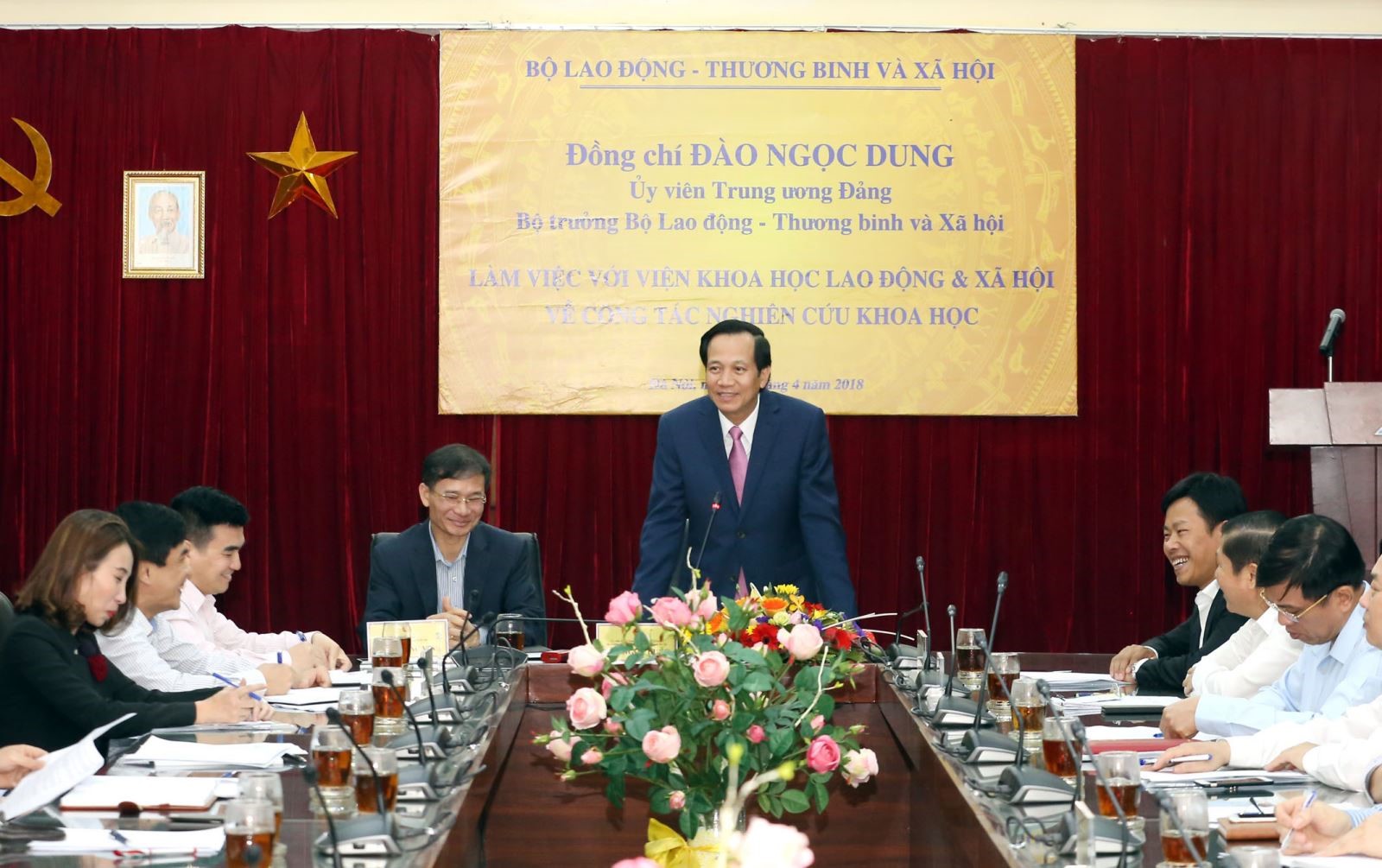
Minister Dao Ngoc Dung congratulated the Institute of Labour Science and Social Affairs on its 40th anniversary
Within the framework of the agenda, Minister Dao Ngoc Dung proposed that in addition to listening to ILSSA’s report on its results, representatives ofthe agencies and units in the Ministry should take a chance to share and make suggestions for the direction of the Institue’sactivities in the upcoming time through answering directed questions such as "has the Institute really been a reliable supporter to meet the expectations of the Ministry's leaders? Are theoretical research and practical applications appropriate? What should the Institute do to improve its research? Where is the Institute in the breakthroughs of the industry, etc”.
At the meeting, director of the Institute of Labour Science and Social Affairs (ILSSA) Dao QuangVinhreported that the Institute had conducted research in three areas, including theoretical research, practical summary and implementation research organization and had made continuous efforts to lead in new emerging issues related to the fields of the industry. In 2017, the Institute hadsubmitted a proposal for3 ministry-level research programs to the Ministry of Construction and conductedthem. Only the Institute had implemented 12 out of 40 ministry-level subjects (30%) and 16 regular tasks according to its function. Moreover, the scientific management of the Institute had been improved to meet the requirements of renewing the technological and scientific trigger mechanism. Research activities were close to the mission of the sector, providing timely theoretical and practical basis for management and making policies. In addition, the Institute also collaborated with international organizations such as ILO, GIZ, OECD, UNDP, etc. and localities in running provincial level projects, supported enterprises in researching and implementing programs and tasks under the management of the ministry of Labour, Invalids and Social Affairs.
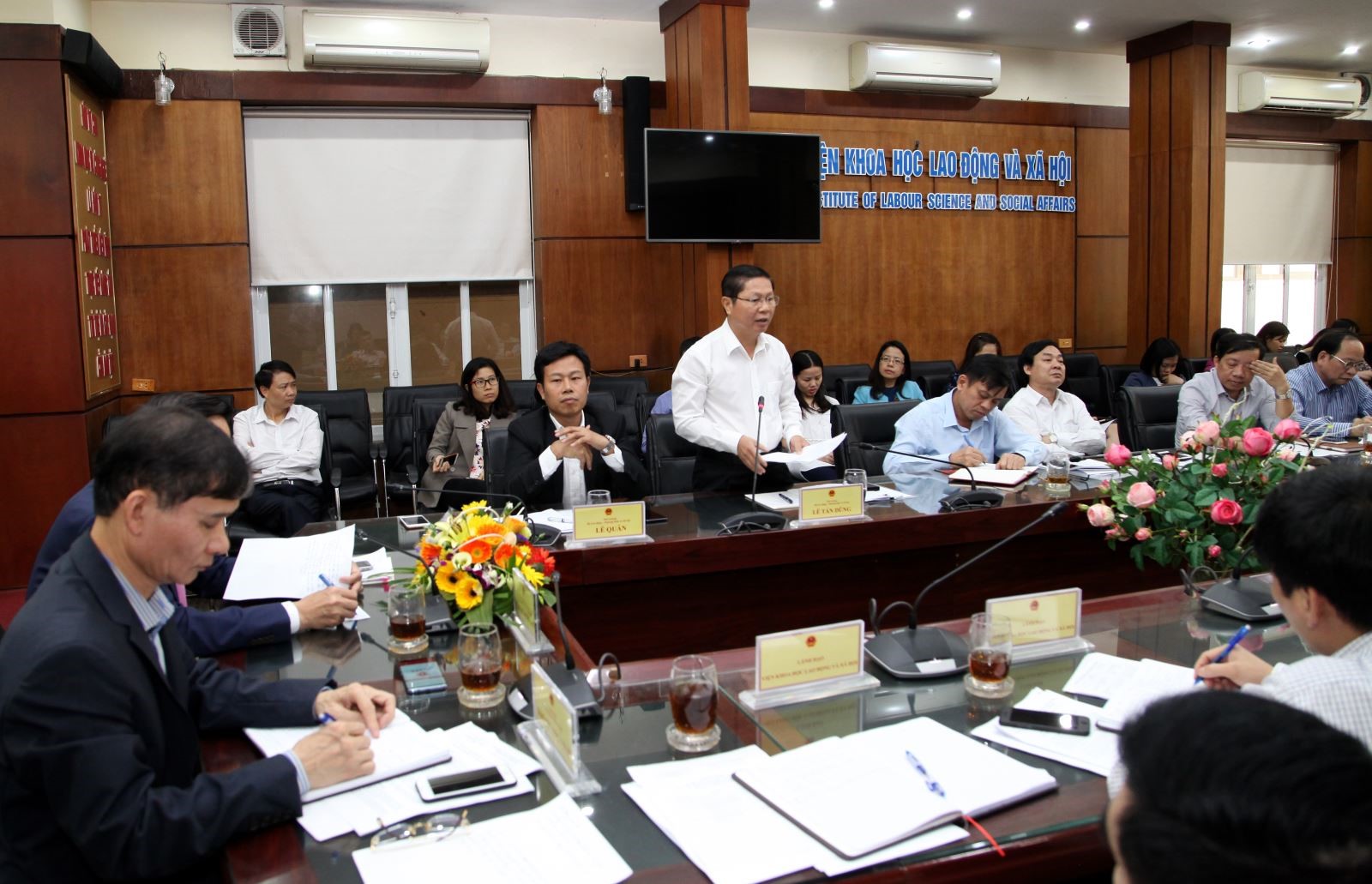
Deputy Minister Le Tan Dung proposed that the Institute of Labour Science and Social Affairs should stick out for key State-level scientific and technological research works in the coming time.
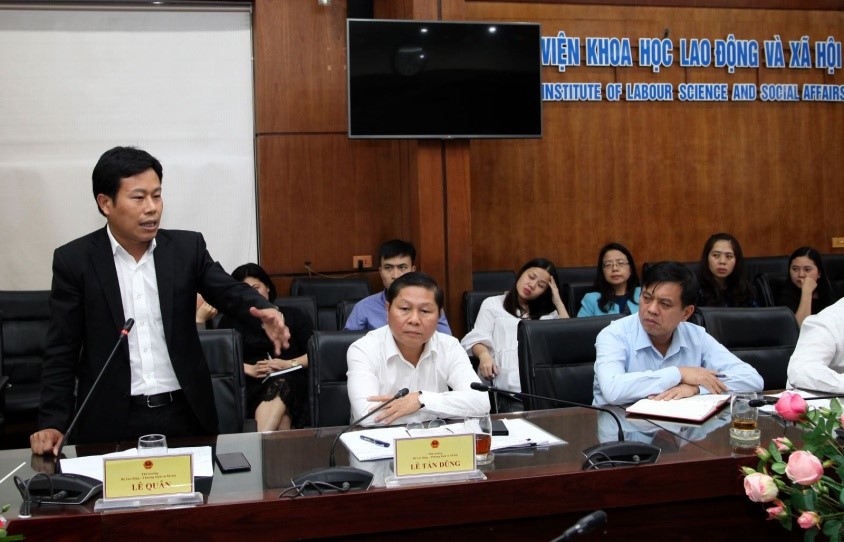
Deputy Minister Le Quan emphasized that it was necessary for the Institute of Labour Science and Social Affairs to develop its development strategy in the upcoming time, linking with the research direction from which to set up the key scientific programs and form research groups for clear output products
Seeing that staff training is of vital importance, the Institute has made continuously efforts to encourage and facilitate staff to attend short-term and long-term training courses, both inside and outside the country. In addition, the Institute organizesanually 10 international conferences and 20 workshops on activities and science.
However, along with those great achievements, limitations seem to exist in the ILSSA’s performing scientific research such as the management fields of the industry are quite broad and raisenumerous matters; there are a lot of new and emerging issues while the research has neither covered all nor timely provided theoretical grounds and practical evidence for developing and completing the Ministry’s policy institute; lacking large-scale research to comprehensively address the industry’s major issues of both theories, practical summary and suggestions for solutions; the research quality of some topics is low and on back schedule.
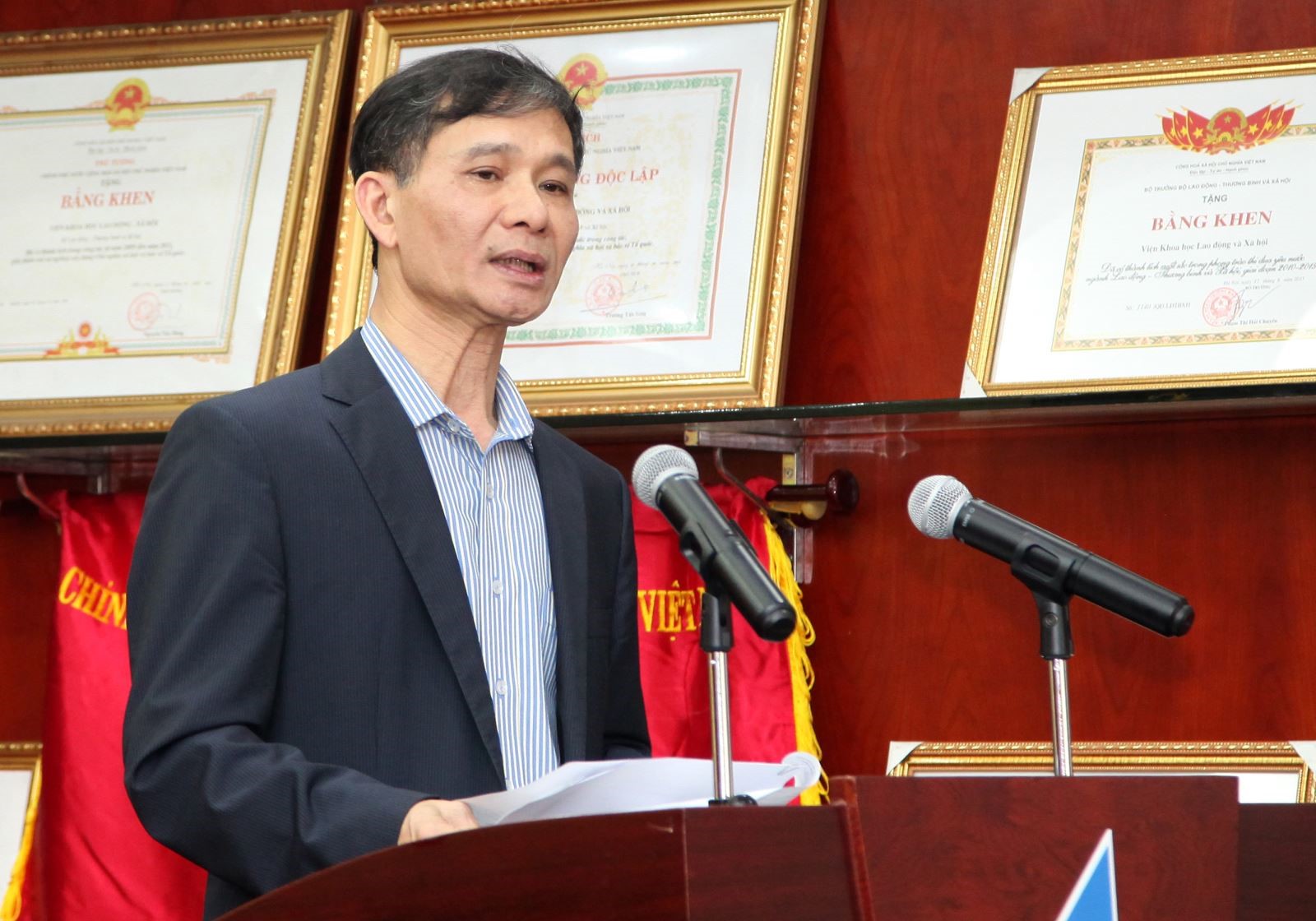
ViệntrưởngViện KHLĐXH ĐàoQuangVinhtrìnhbàybáocáotạibuổilàmviệc
On the report to the Minister, Director General Dao QuangVinhalso pinpointed some difficulties and inadequacies in the operation of the Institutesuch as the tardiness in theInstitue’scoordination with the General Statistics Office led to delays in reporting to the Ministry, forecasts for labor market had not been made in the long run, there was no clear social impact assessment on some programs and policies, overseas training activities were limited to civil servants and officials while employees and contract staff at the Institute were quite crowded.
In the spirit of openness, representatives of the participants also agreed with the contents of the report on activities of the Institute of ILSSA and made suggestions to improve the direction of activities of the Institute in the coming time. For example, the Institute for Social Sciences should have research on a number of issues based on scientific evidence, theoretical and international experience. In fact, the Institute had effective surveys whose findings were quite difficult to see and use. Therefore, it is necessary to have various activities to reflect and introduce the research findings in a deep and selective way. Of those, media activities are of vital importance to reach a policy agreement in community. Scientific research needs to quickly detect and takes problematic approaches to meet the needs of not only specialists and policy makers but also to get closer to the people in terms of data, as well as heading forecasts.
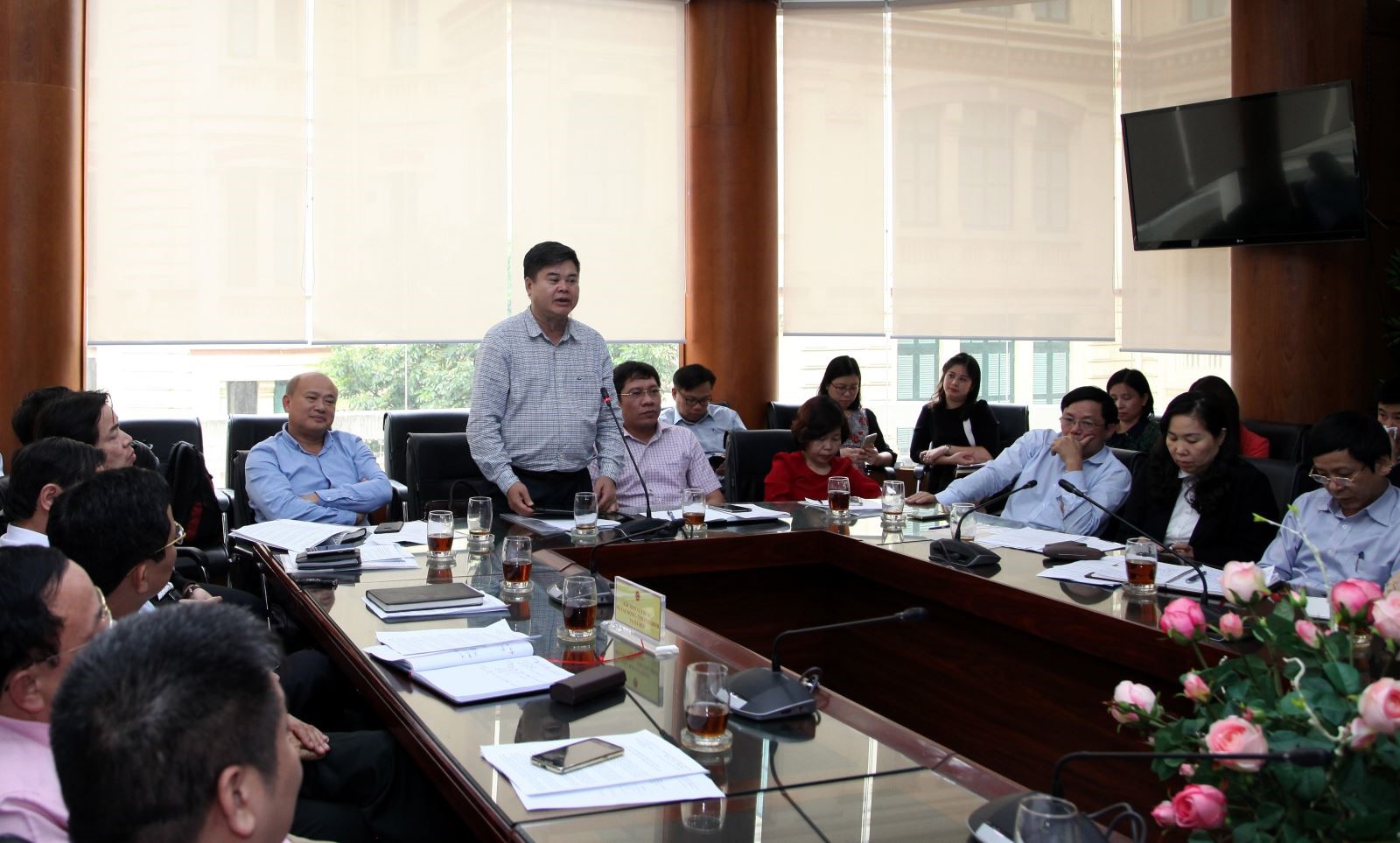
Representatives of the ILSSA’Units spoke at the discussion
At the meeting, representatives of the units also suggested that there should have a closercoordination between the Institute and its units. For example, a proposalfor studies to support the units (such as those on children employment, gender in labor, insurance policy, employment demand, etc.) from the representative of Legal Department, which not only provided scientific evidence and arguments, but also responded in a practical manner through surveys. This is a difficult task for state management units due to the conditions involved, especially the shortage of experts, researchers and budget for scientific and technological research activities.
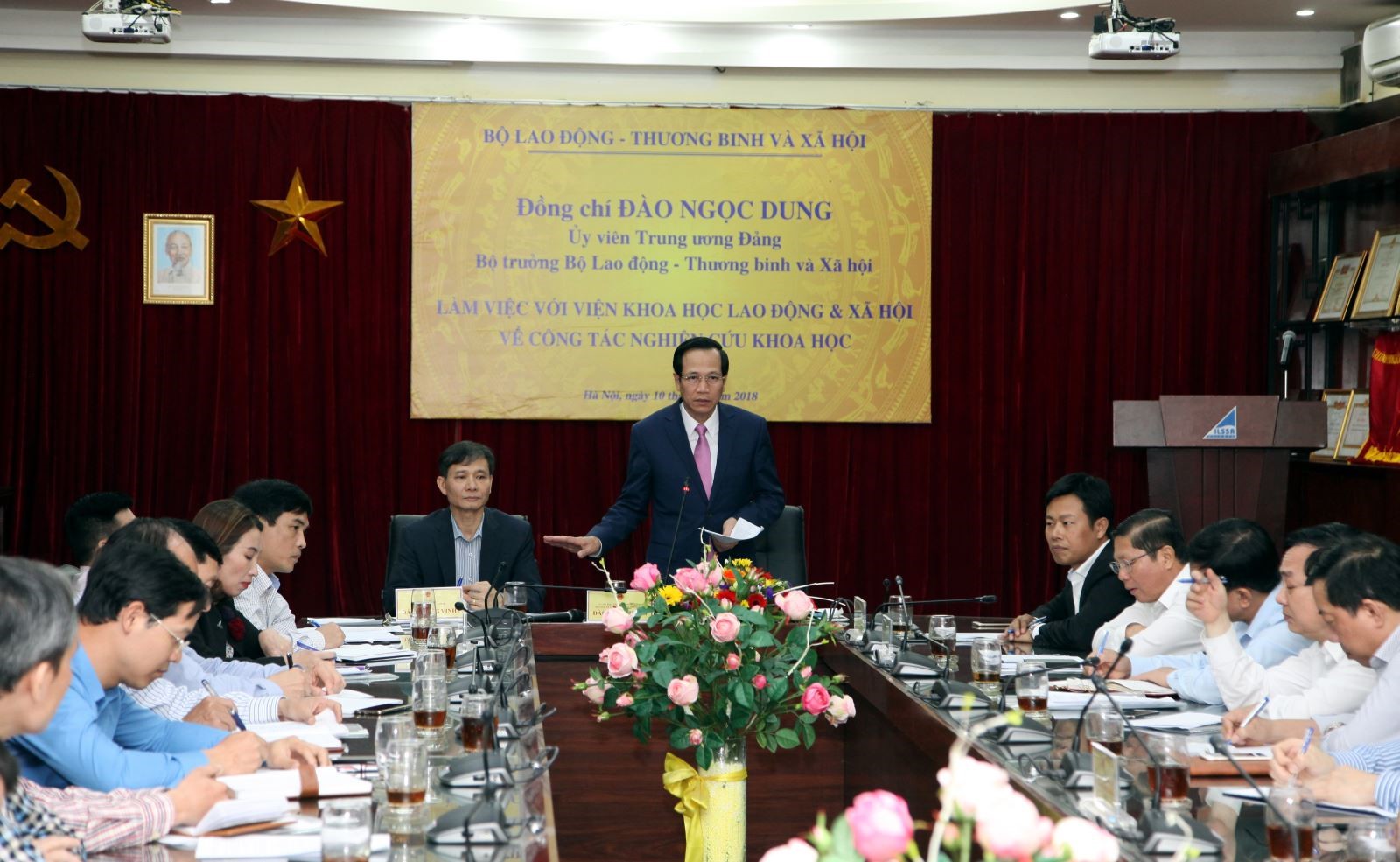
Minister Dao Ngoc Dung suggested that the Institute of Social Sciences should innovate scientific research to meet the requirements of labor development, national devotees and society.
At the end of working session, Minister Dao Ngoc Dung emphasized that the ILSSA had gradually affirmed its role in scientific research at the service of managing and making policies on labor, national devotees and society. The ILSSA’s research findings had not only contributed to developing the theoretical system of labor science and social affairs and improving the institution of the socialist-oriented market economy but also provided scientific arguments for the Communist Party and the State to set forth policies, formulate and organize the implementation of mechanisms, policies and laws on labor, national devotees and society.
In addition to focusing on the distressing issues of social labor, contributing to the development and institutionalization of the Communist Party’s documents and resolutions on labor policy, national devotees and society, the ILASS had built legal systems and policies to ensure the country’s social security. "Some of the Institute's research results have been left an critical remark in the development stages of the MOLISA, such as the promulgation of the labour law in 1994 and later specialized laws; the National Target Program on Hunger Eradication and Poverty Reduction, National Employment Program, policies on basic social services, social insurance and social security policies " said Mr.Dung.
According to the Minister, in the context of international integration, it would be a challenging mission of scientific research for the ILSSA in the coming time to face the trend of aging population, climate change, the impact of the fourth industrial revolutionand emerging issues that requiredbeing researched and solved thoroughly such as decent work, human resources training, employment transformation and job creation under the influence of the era of automation and digitization, labor relations in a shared economy, livelihoods and livelihood conversion for people in adaptation to climate change,the development of an equitable and sustainable system for social security that effectively supportedvulnerable groups, adapted to the trend of the aging population and aimed to keep people from being left behind in the development process.
The Minister suggested thatasa leading research institute on labor policies, national devotees and society, the ILSSA should make more efforts, soon affirm its first position in scientific research to turn science and technology a key factor for the labor development, national devotees and society. In the coming time, it is necessary for the Institute to focus on innovating the following issues:
1.Development strategies: The ILSSA should soon become an academic center of the Ministry, gathering and promoting the collective wisdom of researchers both inside and outside the industry of labor, invalids and social affairs to serve scientific research and human resources training in labor science and social affairs. The ILSSA needs timely announce meaningful and practical scientific research works in service of the policy formulation of the Communist Party and the State and erecting a tectonic government. In addition, the Institue needs closely coordinate with the Communist Party, the Committees of the National Assembly, related ministries, branches and research institutes in establishing and implementing the State-level key science and technology programs in the field of labor and society in the period of 2020-2025.
2. Scientific research orientation: There must have an equal harmony between theoretical and applied research and practical summary. Importantly, a priority should be given to research on the development and refinement of theoretical and methodological systems of labor science and social affairs in line with the world’s progressive trends, especially in the construction of toolkits and models for analysis and evaluation; focusing on leading research and strategic predictions to address new issues in the area of social security.
3. Building up a contingent of cadres and researchers:The Institute should actively accumulatenew knowledge, train creative thinking, constantly foster the scientific worldview and see problems under the developmental perspective. In addition to paying special attention to fostering and raising the level of foreign languages in order to better updating and timely accessing to new knowledge, meeting the requirements of scientific research in labor science and social affairs in the context of rapid change in science and technology, the Institute must be the source of high-quality staff for the Ministry to servethe demand of cadres works in the development of the labor, invalids and social affairs in the new period.
4. Technical facility improvement for research: To become a convergent center for labor science and social affairs research appealing to researchers both inside and outside the industry, the Institute's should be routinely equipped with advancedtechnical facilities to support scientific research. At first, the Institute has to make full use of advances and advantages of information technology in completing and improving technical facilitiesof the units, especially in the collection and building of databases standardized for researching the fields of the industry, promoting and disseminating information on labor science and social affairs.
5.Cooperation in scientific research: The Institute should diversify the forms of research cooperation at home and abroad into research linkages and consultation service contracts / independent consultants. Moreover, it is also necessary for the Institute to focus on the maintenance and expansion of international cooperation in researching labor science and social affairs with its selective learning to update the world's progressive trends (methodology, advanced research tools)to improve the quality of scientific research and serve the labor force development, national devotees and society in the new period.
Source: http://www.molisa.gov.vn/vi/Pages/chitiettin.aspx?IDNews=27702
| Total visited: | 2.998.077 |
| Visit today: | 2.217 |